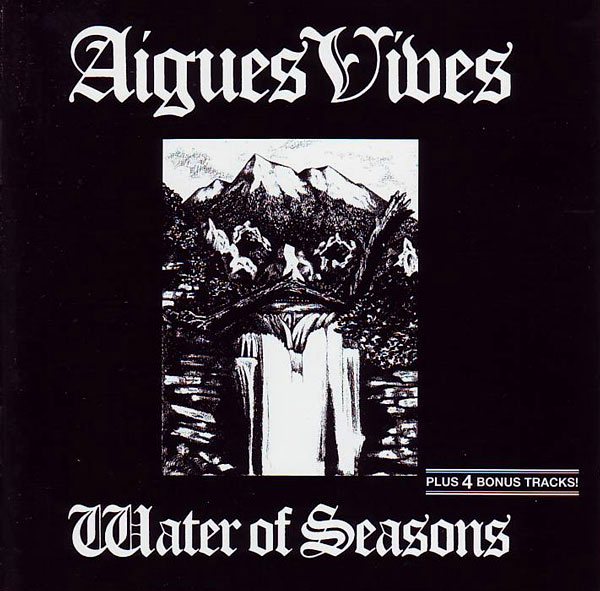|
|
|
01 |
The Accident |
|
|
|
05:59 |
|
|
02 |
Heroes |
|
|
|
07:58 |
|
|
03 |
Dent Du Geant |
|
|
|
02:36 |
|
|
04 |
Night |
|
|
|
04:07 |
|
|
05 |
Flying Fortress |
|
|
|
05:12 |
|
|
06 |
Water Of Seasons |
|
|
|
02:50 |
|
|
07 |
Mediterranean Journey |
|
|
|
05:47 |
|
|
08 |
Planet Of Dreamers |
|
|
|
05:55 |
|
|
09 |
The Knight Errant - Bonus |
|
|
|
04:08 |
|
|
10 |
E Pericoloso Sporgersi - Bonus |
|
|
|
04:05 |
|
|
11 |
The Sailor - Bonus |
|
|
|
03:27 |
|
|
12 |
The Forest Queen - Bonus |
|
|
|
03:10 |
|
|
|
| Country |
Germany |
| Original Release Date |
1981 |
| Cat. Number |
CD 102 |
| Packaging |
Jewel Case |
| Spars |
DDD |
| Sound |
Stereo |
|
|
|
Aigues Vives was founded in 1971 in Germany (in the area nearest to the border of Belgium). The group named themselves after a French town which refers to Latin ‘aqua vivae’ or ‘living water’ or ‘prosperous fountain/source’. The band was first influenced by the English progressive rock scene. After some changes, in 1974, they turned to folk instead. The repertoire at that time included French and Irish folk songs. Late 1980-early 1981, as a 6-piece group, they recorded their first album called “water of seasons” which was published as a 1000 copies limited edition. After that the group evolved towards a more rock sound once more. In 1983-1984 they recorded a 4-track cassette “dwarfs casting long shadows”, which can be found here as bonus tracks. It was intended to present the first ideas for a second LP which never came. The CD reissue was taken from the master tapes.
The tracks of the LP have a fine Folk-Rock sound, with English vocals, and bit of improvisation with violin or flute to the guitars, which provide mood flavours, while always remaining within one sort of comparable drive. In that way the dreaminess of the improvisations only provide a fine and enjoyable somewhat progressive folk sensibility to the songs.
The tape has two sorts of directions, a traditional or medieval bard-folk flavour in the songs, with dominating accompaniment of guitars, and use of vocal harmonies and some flute, as if related with some story telling reference on stage, while “E Pericoloso Sporgersi” is more progressive rock led by electric guitar (with bass and drums) and a bit of simple keyboards. In some way a strummed rock singing core is noticeable everywhere as a fundament for further arrangements. On the tapes their new musical direction does not come out extremely well yet, but the group never seem to have had the chance to put these new elements into a bigger context.
